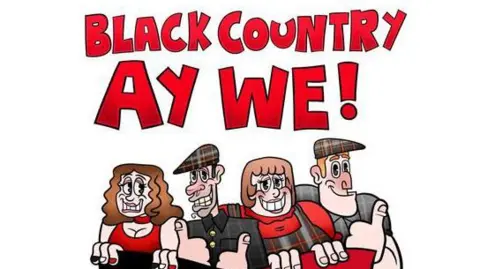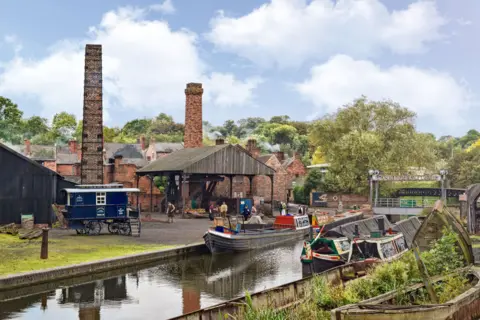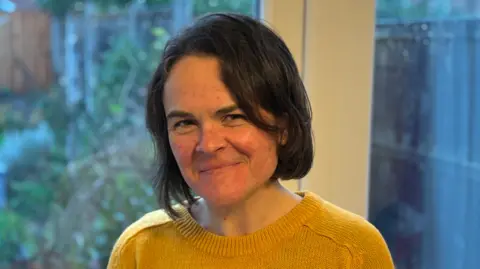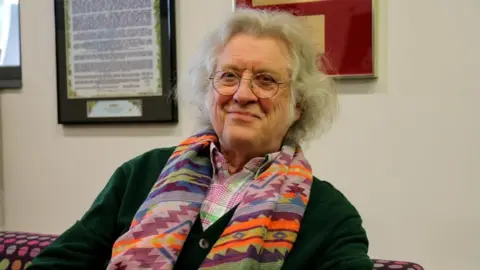Is the Black Country Dialect disappearing?
 Black Country Cards
Black Country CardsOwhamya? Yam bostin'...Tara-ar-bit.
If you know what these phrases mean, you may have grown up in the Black Country or be a fan of Peaky Blinders.
They are as synonymous with the area as its foundries, canal network and faggots (meatballs made from off-cuts and offal) and grey paes (yes, paes).
But are these words and phrases here to stay?
Dr Esther Asprey, senior lecturer in English Language and Linguistics at the University of Wolverhampton, has been researching what the future looks like for the Black Country's distinctive dialect - and whether it risks dying out.
Historically the Black Country, an area which was once engulfed by a 30ft coal seam, is made up of West Bromwich, Oldbury, Blackheath, Cradley Heath, Old Hill, Bilston, Dudley, Tipton, Wednesfield and parts of Halesowen.
Today, however, the four local authorities in the area - Dudley, Walsall, Sandwell and Wolverhampton - are typically known as the Black Country councils even though some will argue that's not quite correct.
As with any language, we are reliant on the previous generation to pass on their language traits to the next, Dr Asprey said.
"It is kept alive by a great number of people who use and speak it every day, it's in a really good position as they use the dialect without even thinking about it - it's their first language."
 Black Country Living Museum
Black Country Living MuseumAt The Black County Living Museum where visitors are transported back in time and immersed in area's history, the dialect thrives.
Matthew Cowpe is the head of interpretation and collections and said the dialect is crucial to the retelling of stories from the past by its volunteers.
"It's very important for to us to use this language, people are very passionate about their identity," Mr Cowpe added.
Visitors to the attraction, also used for Peaky Blinders filming, are greeted with with the phrase "owbist", which means how are you and are told to "have a bostin day".
"We take a lot of pride in using certain phrases in our on site material and social media posts, but we are conscious that not everybody understands the dialect, so we have to be accessible," he said.
You cor do that
However the dialect could be under pressure due to the use of standard language.
"We are taught to read and write in standard English and although teachers may acknowledge regional varieties, having a standard can threaten our ability to preserve dialects," Dr Asprey said.
In 2013, Colley Lane primary school in Halesowen banned pupils from talking and writing in the dialect and said they had a "zero tolerance approach" towards the students using Black Country phrases, including "you cor" instead of "you can't".
A list of prohibited phrases sparked uproar in the community as they spoke out to fiercely protect their heritage.
Despite the efforts of the education system, Dr Asprey said the dialect could still be thought to be growing as the younger generation continue to introduce new words such as "twag" which means telling tales.
 Esther Asprey
Esther AspreyShe also credits "online spaces" for helping the dialect to grow, as people are writing in the same way as they speak.
For example, Wolves fans regularly use phrases on X such as "Wolves ay we", on football forums.
There has been a greater sense of pride in the dialect following the success of Peaky Blinders, Dr Asprey said.
The show, which concluded in 2022 after six seasons, was streamed more than seven billion times and film crews have recently been back in the area for a new production featuring the Shelby clan.
 Getty Images
Getty ImagesMaisie Stokes, an artist from Halesowen, designs Black Country greeting cards which feature phrases such as "we want yow to 'ave a bostin birthday" and "yam getting old".
The 24-year-old said the phrases add "colour and character" to her work and enable her to preserve the region's history.

Julie Walters, Lenny Henry and Noddy Holder are among the area's most famous exports and who help to give the Black Country accent and dialect a platform.
Bostin - some Black Country phrases
- babby = baby
- bostin = excellent
- cor be bovvered = can't be bothered
- 'oss road = the street (oss, meaning horse, as in where horses would have walked)
- owamya = how are you
- saft = stupid
- tararabit = bye for now
- tay = tea
- uwa = ouch
- wum = home
Dr Asprey will talk at Wolverhampton Literature Festival in the Creation Suite in Wolverhampton Art Gallery on Sunday 2 February at 15:00 GMT.
Follow BBC Wolverhampton & Black Country on BBC Sounds, Facebook, X and Instagram.
